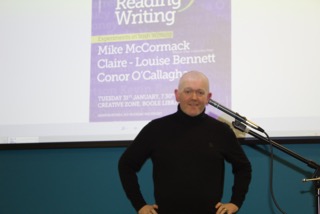PhD student Laura McKenna was at the second reading of the School of English series in which Mike McCormack, Claire-Louise Bennett and Conor O’Callaghan read together. The different voices led to a discussion of voice – and place – in writing.
When Conor O’Callaghan, right, dreams of Nazis chasing him down the streets, those streets always belong to Dundalk.
This observation was typical of the quirky, entertaining and informative discussion that took place during the second of UCC’s School of English Reading Series on January 31, featuring Mike McCormack, recent winner of the Goldsmiths Prize for Solar Bones, Conor O’Callaghan, poet and novelist and Claire-Louise Bennett, short story writer.
Conor O’Callaghan was first to read. “Just six pages but slowly,” he said. I hadn’t read his novel, Nothing on Earth, but found his excerpt a compelling blend of clear observational prose with an unnerving edge. I’d heard Claire-Louise read before, at the Cork Short Story Festival and I bought her book Pond on the strength of it. Wonderful stuff, but she haunted my own reading of her stories; I could actually hear her voice in my head. It could be due to her theatre background but I wouldn’t be surprised if she’s a ventriloquist as well as a highly original writer. The spoken words seem to rush out of her in a way that goes beyond the “stream of consciousness” tag. Mike McCormack chose a passage from his book relating to the protagonist’s father, highlighting both the novel’s roots in Mayo and the tone of helplessness in the face of illness/grief/mental disintegration.
So the readings were good but things really kicked off with the discussion afterwards, chaired by Mary Morrissy. The interplay between the speakers was nuanced, considered and at times very funny (which from my limited experience isn’t always the case). They even took to questioning each other.
Roots and place were discussed and the importance of setting; very important it seems for Conor O’Callaghan, always Dundalk, hence the Nazis dream. And besides, until recently Dundalk has not featured highly on the literary map. We’ll have to take his word for that.
When Mike McCormack begins to write, as long as the story is firmly planted in Mayo, then anything can happen, but the inspiration always comes from Mayo. Especially the landscape of Louisburgh. (Which I had to look up when I got home, I mean how does a village in Mayo get such a name? Why, it’s named after the fortress town of Louisburg in Nova Scotia and not due to any recent civic twinning initiative but because a member of Lord Altamont’s family had taken part in a siege the 1758, and although I wondered if he survived.
(I resisted checking but couldn’t help noticing that before the Louisburgh title was conferred upon the presumably unprepossessing Mayo village – if it even amounted to a village back then – it was known as Cluain Cearbán which means Meadow of Buttercups and which I believe is a far superior and vastly prettier name than Louisburgh and oh dear, I think Claire-Louise Bennett may be taking up residence in my head again though I’m sure I’m flattering myself and really must stop and revert to the literary evening in question. . . now.)
Claire-Louise Bennett’s landscape of choice is an interior one, that of her character’s consciousness and sub-conscious.
Point of view was discussed and in particular the draw or magnetic pull (Mike McCormack) to the first person perspective, which, it seems, applied to all three writers. In contrast, Mary Morrissy reported setting out to write in the first person in more than one of her novels but finding that third person felt right. Mike wondered if he should push himself to try out other points of view, noting that even in his short story work, the first person perspective takes precedence. Perhaps, he suggested, he should give space to “we”. He didn’t sound convinced. In fact, all four writers conveyed a sense of the voice speaking for itself.
I just hope it doesn’t continue to speak to me!
The next reading in the series is by Lionel Shriver on March 14.

